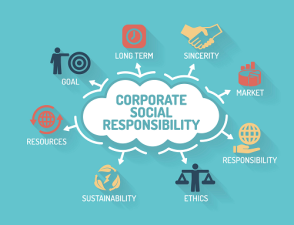How & Why Socially Conscious Companies Sell More 11/23/2016
Social responsibility is a growing consumer concern. With employers pushing direct donations through platforms such as United Way and offering to match volunteer hours with cash donations, charitable giving has become a way of life. Corporate social responsibility (CSR) has also come into the spotlight. Today's consumers talk about their purchases. They discuss what and why they choose a particular retailer or product. One of the factors that often makes the list is CSR.
Indeed, CSR can be a factor that differentiates one seller from another in a crowded market. A 2014 survey by Nielsen showed that more than 50 percent of online customers around the globe would pay more for a product manufactured by a company that was socially and/or environmentally responsible.
CSR in Action
Major brands such as Warby Parker and Toms have taken a very direct approach. When a customer buys a pair of shoes or glasses, the companies also donate a pair to people in need. SoapBox Soaps, does the same with bars of soap. Box Lunch, a retail chain, donates a meal for every $10 sold. The examples are endless, and consumers enjoy feeling good about their purchasing decisions, particularly when the quality of the product makes it an easy value proposition.
Smarty Pants vitamins also offers a 1:1 donation option. For every bottle of vitamins they sell, they partner with Vitamin Angels to donate a bottle to high-risk populations. That means more kids around the world make it to adulthood as a direct result of buying a bottle of vitamins. What could be more heartwarming and worth sharing than saving a child's life?
Sustainability is another big part of CSR. Ethically sourced material used in the most energy-efficient process can give you a boost in the marketplace. It can also help you save big on utilities, a path General Mills is embracing.
Transparent Participation Is the Key to Effective CSR
When you hear about CSR, the first thing that comes to mind might be your bottom line; however, CSR is about a lot more than just giving away product. Ultimately, corporate social responsibility is about leaving the world a little better than you found it. That doesn't have to translate into more expenses for your business. Sometimes, a focus on sustainability saves you money. If you work on minimizing the environmental impact of your manufacturing process, you might find ways to save energy. Corporate social responsibility is not about finding a way to promote your generosity. It's about being transparent, honest and authentic with your CSR choices.

